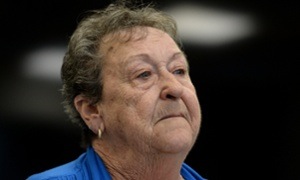
A long-running fight to stop private companies from owning the rights to isolated human gene mutations has reached Australia’s high court, and is the last legal hope for those seeking to stop gene patenting.
The case dates back to December 2013, when the federal court of Australia ruled that a US-based biotech company, Myriad Genetics, had the right to a patent over a cancer-causing mutation of the BRCA1 gene.
The ruling gave private companies the right to control certain mutations in human genes, and to stop anyone else from researching those genes without permission.
In September, the federal court rejected an appeal to the decision led by cancer patient Yvonne D’Arcy.
D’Arcy has twice been diagnosed with breast cancer and believes a gene mutation was not a human invention and therefore, not patentable.
The federal court, however, ruled patents on breast cancer genes were valid because the method of isolating the gene was a human invention.
Other cancer research advocates, including the Cancer Council of Australia, have long argued gene patenting stymies medical research by making it more expensive, costs which are then passed on to patients when treatments are discovered.
Through its company Genetic Technologies, Myriad owns the licence for the test for the BRCA gene in Australia, and cancer advocates believe this test will be made more expensive by the patent.
D’Arcy has now taken the case to the high court, which over the next two days will decide whether to uphold the federal court’s decision.
A leading patent lawyer from Murdoch University in Western Australia, Professor Luigi Palombi, said isolated pieces of the BRCA1 gene, associated with a higher risk of breast and ovarian cancer in some women, should not be patentable and that doing so would hamper medical innovation.
He was hopeful the high court would overturn the previous decision, after the supreme court in the US ruled unanimously last year that natural human genes could not be patented.
In that decision, the court said human DNA was a product of nature, placing it beyond the domain of patent protection.
The decision in Australia, Palombi said, defied good policy and common sense.
“The fact that scientists and companies interested in developing new diagnostics and treatments in the US can do that without negotiating through a maze of gene patents gives them a distinct advantage,” he said.
“It reduces research costs dramatically, and means research can go ahead without people worrying about infringing someone’s patent.
“It also makes it much easier to get funding for research, if investors can be confident the research can go ahead without problems, and it allows research to be carried out faster.”
It would make sense for the high court to rule similarly, Palombi said.
“The high court, this is the end of the road, other than parliament, to having the federal court decision overturned,” he said.
“If the decision is not overturned Australia will be out of sync with the US, and that is very important.”
